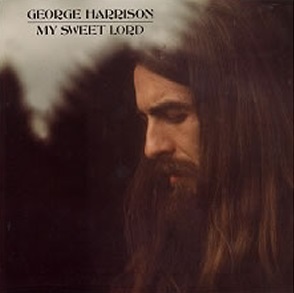(Single from the album All Things Must Pass, Apple Records, 1970)
A Brief History
____________________
"My Sweet Lord" is a song by English musician and former Beatle George Harrison that was released in November 1970 on his triple album All Things Must Pass. Also issued as a single, Harrison's first as a solo artist, "My Sweet Lord" topped charts worldwide and was the biggest-selling single of 1971 in the UK. In America and Britain, the song was the first number one single by an ex-Beatle.
George Harrison began writing "My Sweet Lord" in December 1969, when he, Billy Preston and Eric Clapton were in Copenhagen, Denmark, as guest artists on Delaney & Bonnie's European tour. By this time, Harrison had already written the gospel-influenced "Hear Me Lord" and "Gopala Krishna", and (with Preston) the African-American spiritual "Sing One for the Lord". He had also produced two religious-themed hit singles on the Beatles' Apple record label: Preston's "That's the Way God Planned It" and Radha Krishna Temple (London)'s "Hare Krishna Mantra". The latter was a musical adaptation of the 5000-year-old Vaishnava Hindu mantra, performed by members of the International Society for Krishna Consciousness (ISKCON), colloquially known as "the Hare Krishna movement". Harrison now wanted to fuse the messages of the Christian and Gaudiya Vaishnava faiths into what musical biographer Simon Leng terms "gospel incantation with a Vedic chant."
The song's lyrics reflect Harrison's often-stated desire for a direct relationship with God, expressed in simple words that all believers could affirm, regardless of their religion. Author Ian Inglis observes a degree of "understandable" impatience in the first verse's line, "Really want to see you, Lord, but it takes so long, my Lord." By the end of the song's second verse, Harrison declares a wish to "know" God also and attempts to reconcile the impatience:
I really want to know you
Really want to go with you
Really want to show you, Lord, that it won't take long, my Lord
Following this verse, in response to the main vocal's repetition of the song title, Harrison devised a choral line singing the Hebrew word of praise, "hallelujah", common in the Christian and Jewish religions. Later in the song, after an instrumental break, these voices return, now chanting the first twelve words of the Hare Krishna mantra, known more reverentially as the Maha mantra:
Hare Krishna, Hare Krishna
Krishna Krishna, Hare Hare
Hare Rama, Hare Rama
These Sanskrit words are the main mantra of the Hare Krishna faith, with which Harrison identified, although he did not belong to any spiritual organisation. In his 1980 autobiography, I, Me, Mine, Harrison explained that he intended repeating and alternating "hallelujah" and "Hare Krishna" to show that the two terms meant "quite the same thing," as well as to have listeners chanting the mantra "before they knew what was going on!"
Harrison's version of "My Sweet Lord" was an international number 1 hit by the end of 1970 and through the early months of 1971 – the first solo single by a Beatle to reach the top, and the biggest seller by any of the four throughout the 1970s. Without the support of any concert appearances or promotional interviews by Harrison, the single's commercial success was due to its impact on radio, where, Harrison biographer Gary Tillery writes, the song "rolled across the airwaves like a juggernaut, with commanding presence, much the way Dylan's 'Like a Rolling Stone' had arrived in the mid-sixties". Elton John recalls first hearing "My Sweet Lord" in a taxi and names it as the last of the era's great singles: "I thought, 'Oh my God,' and I got chills. You know when a record starts on the radio, and it's great, and you think, 'Oh, what is this, what is this, what is this?' The only other record I ever felt that way about [afterwards] was 'Brown Sugar' ..." In his 40-page Harrison tribute article for Rolling Stone in 2002, Mikal Gilmore credited "My Sweet Lord" as being "as pervasive on radio and in youth consciousness as anything the Beatles had produced."
The single was certified gold by the Recording Industry Association of America on 14 December 1970 for sales of over 1 million copies. It reached number 1 on the US Billboard Hot 100 on 26 December, remaining on top for four weeks, three of which coincided with All Things Must Pass's seven-week reign atop the Billboard albums chart. In Britain, "My Sweet Lord" entered the charts at number 7, before hitting number 1 on 30 January and staying there for five weeks. It was the biggest-selling single of 1971 in the UK and performed similarly well around the world, particularly in France and Germany, where it held the top spot for nine and ten weeks, respectively. In his 2001 appraisal of Harrison's Apple recordings, for Record Collector, Doggett described Harrison as "arguably the most successful rock star on the planet" over this period, adding: "'My Sweet Lord' and All Things Must Pass topped charts all over the world, easily outstripping other solo Beatles projects later in the year, such as Ram and Imagine."
The single's worldwide sales amounted to 5 million copies by 1978, making it one of the best-selling singles of all time. By 2010, according to Inglis, "My Sweet Lord" had sold over 10 million copies. The song returned to the number 1 position again in the UK when reissued in January 2002, two months after Harrison's death from cancer at the age of 58.
(From Wikipedia)
.
.

